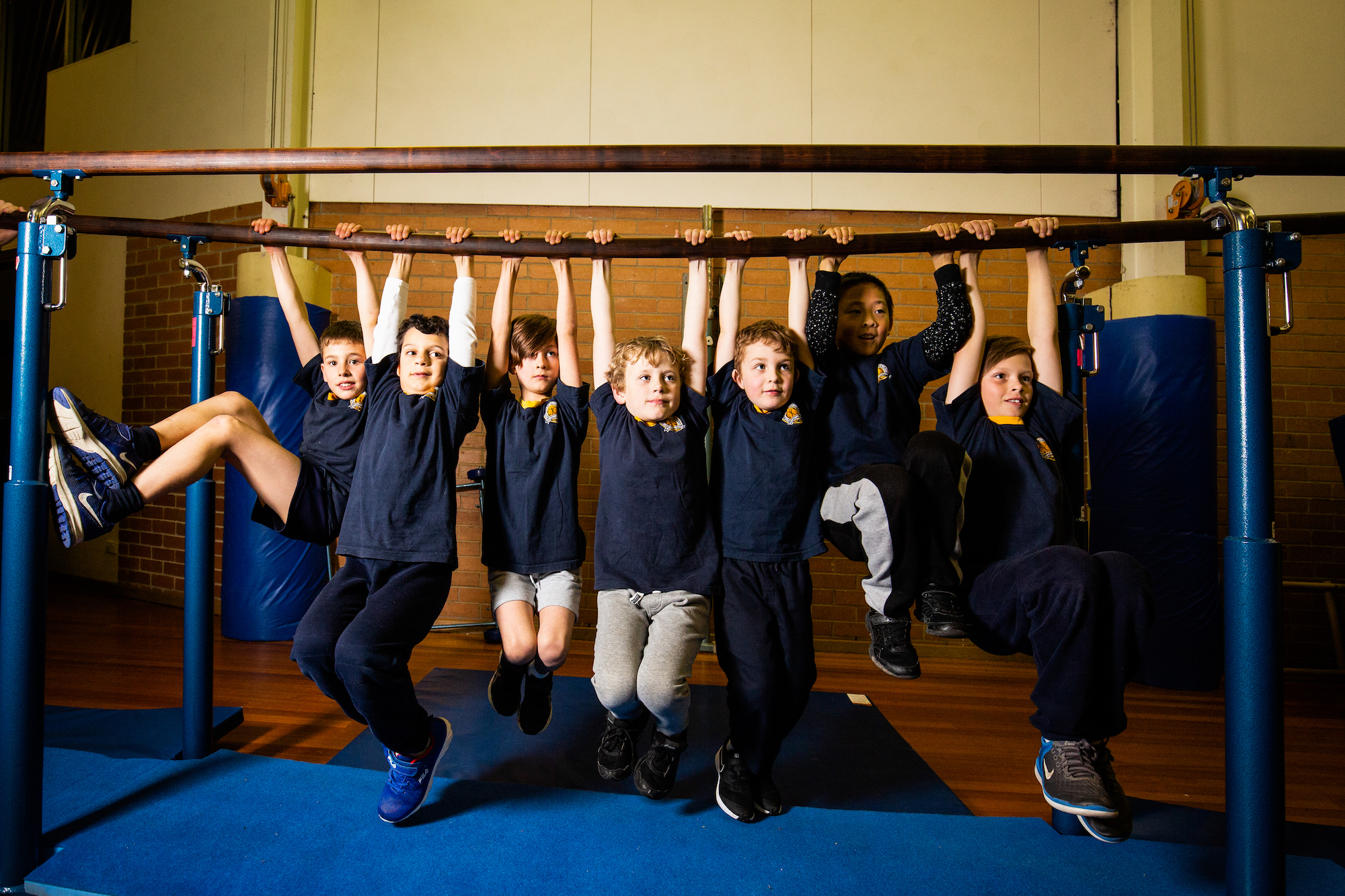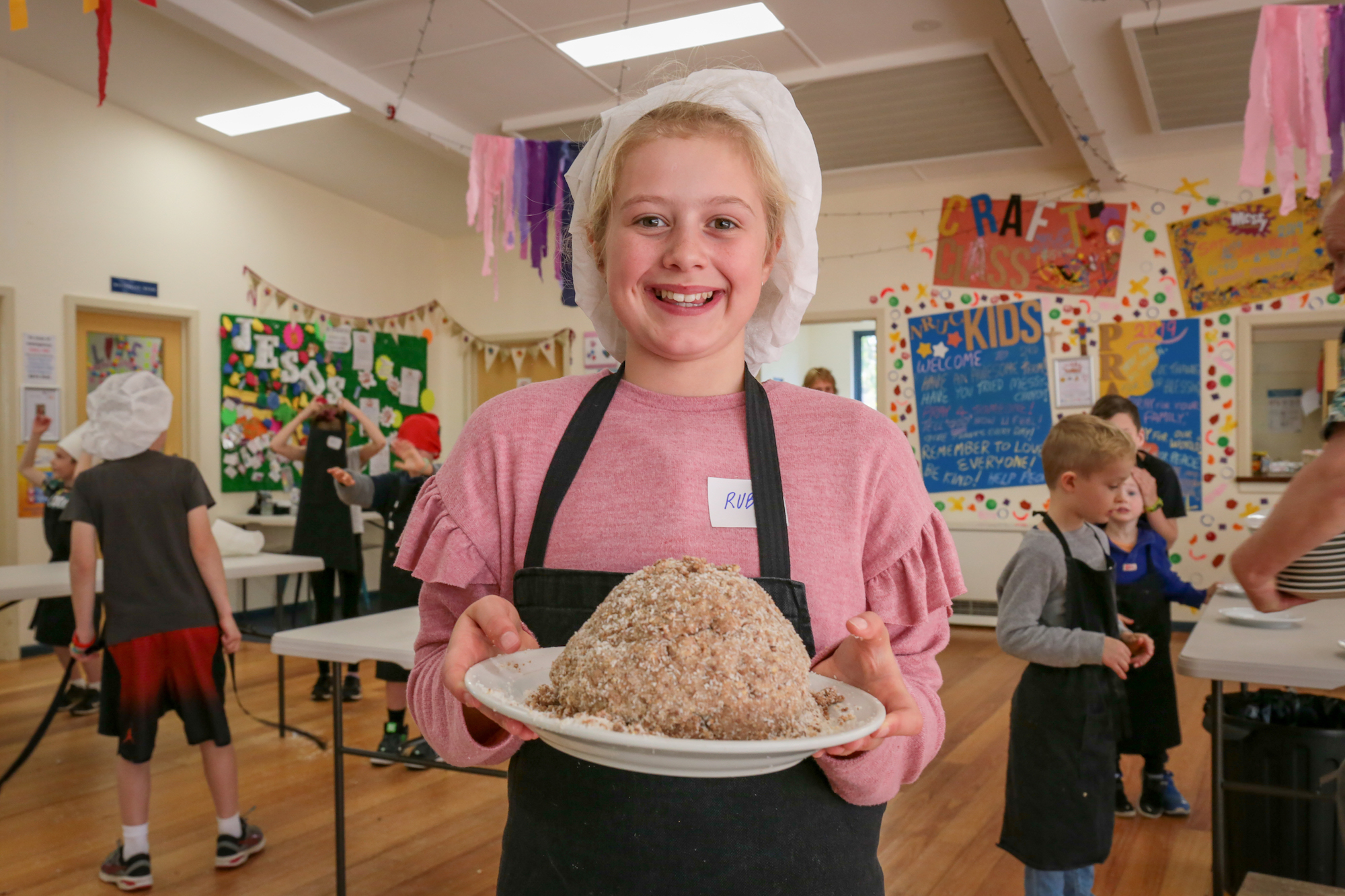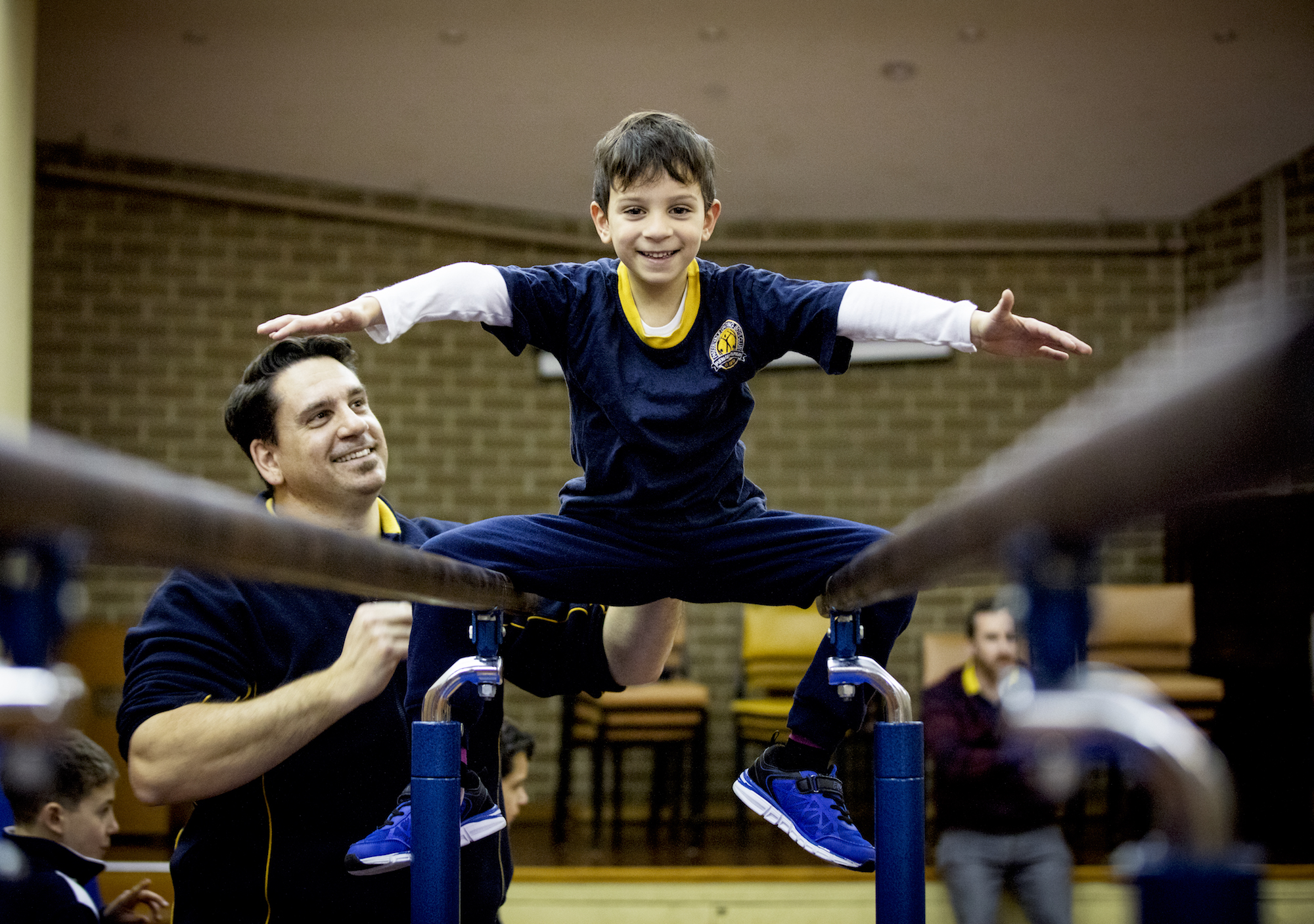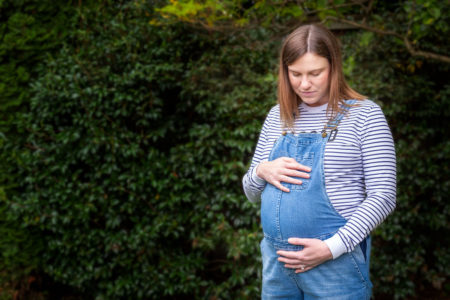
“As a boy, and as a teenager, this club provided real life role models” – Julian Taglieri, Senior Leader, Pascoe Vale Boys Club
By David Southwell
When you add flour to kids in kitchens there’s a good chance more of it will end up on hands, clothes and faces than in the food.
However, despite the odd flurry and a few stray floury handprints that isn’t the case with the young pizza makers in the North Ringwood Uniting Church hall as they diligently knead, flatten and roll their dough on the white-caked trestle tables.
There’s the excited hum of children busily engaged in making something together, and that includes even those who profess to not liking cooking, such as nine-year-old Jake and 10-year-old Bailey, both of whom attend the nearby Holy Spirit Primary School.
“I don’t cook at home,” Bailey says. “But cooking class is fun.”
North Ringwood Children’s and Families Ministry Coordinator Trevor Vernon patrols the tables like a cooking show celebrity chef (although more in the friendly style of a Maggie Beer than a Gordon Ramsey) offering sage words of advice or encouragement. Trevor, who has worked as a chef in Peru, where he did missionary work, began running cooking classes on the first week of school holidays five years ago and later added craft workshops during the second week.
“From the outset it was going to be a way of touching base and getting to know the families who attend our North Ringwood playgroup,” Trevor says.
“I also wanted to reach out to our local primary school, which the North Ringwood Uniting Church has a good relationship with.
“Initially I had three children attend. The following week it went to six and then to 13. Classes now average 25-35 children.”
Getting children involved or even favourably aware of church could be considered the Holy Grail for the UCA, and other denominations, that face no greater challenge than the absence of young people in their ranks.
It wasn’t so long ago that many of these churches were brimming with children, something Synod’s head of Intergenerational Ministry – Children and Families, Chris Barnett, can attest to.
“Some of my earliest memories are at the big Sunday school anniversary, standing up there on a big stage seen by hundreds of people, although I don’t think it was quite that many,” Chris, who grew up attending a Presbyterian church in the 1970s, says.
“It suddenly shifted and, by the time I was probably in grade six, the Sunday school was down to about 30 children.”
By one count, national Sunday school numbers across all denominations almost halved between 1963 and 1973. Chris says the downturn followed the general decline of church participation in the latter half of the 20th century.
Clearly, the Church had to change the way it engaged with young people and it responded in dynamic ways. Sunday schools, where they still exist, have adapted, and you can add to that a whole slew of different programs that enmesh children and youth into intergenerational ministry, such as Messy Church, Godly Play and Mainly Music.
“The question is not ‘how do we sustain a Sunday school?’,” Chris says.
“The question is, how do we participate with children so that their faith and our faith might continue to grow, be strengthened and oriented towards serving the community?
“It takes a bit of work, it takes a bit of rethinking, but we have an incredible opportunity to see young and old learning together, growing in faith together and ideally expressing that faith in ways of justice, mercy and grace to the world. So, I am actually excited by where we are today. “
With the North Ringwood cooking classes, it seems Trevor has found a winning recipe for engaging children.
At one busy table, Ruby, 9, confidently tackles each of the four items being produced that day: chocolate pizza (solid chocolate in a plastic container with lolly toppings), savoury pizza, cupcakes and chocolate rumballs.
It was playground word-of-mouth at the nearby Ringwood North Primary School in Melbourne’s east that first got Ruby interested.

Ruby has been cooking up a storm at the North Ringwood Uniting Church hall for the past three years.
“My friends at school did it and were telling me about it,” she says.
“I went home and told my mum ‘there’s this super cool new craft class’ and I really wanted to try it, so I have been doing it for three years now.”
Trevor says the classes take a lot of effort to organise, but are greatly rewarding.
“To see the looks of achievement in the children’s eyes as they create culinary or craft items is wonderful, and to have repeat children coming over the years tells you that it is a safe environment where they are all accepted as they are, with their own ability, no questions asked, no barrier put in place,” he says.
“I have some families that have been coming for the whole five years. I have one little boy who is on the (autism) spectrum. He has come in from Bendigo the last two years.
“Children never go home empty handed. We usually have two or three bags of goodies to take home and share with our families, although sometimes it all gets consumed in the carpark.”
Perhaps not surprisingly, this has generated plenty of goodwill.
“The mums, the dads, the grandparents and carers say all the time how much their children enjoy the classes,” Trevor says.
“Cooking is an activity that some children miss out on in the busy-ness of family life, which is a shame.
“I quite often get reports back from parents saying their children now love to help out with cooking at home.”
Trevor says the cooking and craft classes serve as outreach to children who otherwise have no contact with church.
“I think it gets kids who are not used to being in a church actually entering the foyer and finding out a little bit about the signage,” he says.
“It’s being Jesus in the world, with children from many different locations, a place of encouragement, a place of creating, a place of interaction, a place where older children are encouraged to assist the little ones and a place to make new friends.”
When school holidays finish you will find a similar style of bonding and mentoring inside the Pakenham Uniting Church hall in Melbourne’s southeast on Tuesday afternoons.
From 3.30pm, St Patricks Primary students will wander into the hall having made the short journey from the school to attend the Pakenham Homework Hub.
First up, they are given a fruit snack and then have a semi-organised run-around outside, weather permitting.
After that comes the more serious business of tackling their homework with the help of mentors, which include volunteers from the Pakenham congregation and high school students from the local Lutheran Lakeside College.
The Hub is run by Pakenham Uniting Church Children and Families Ministry Pastor Jo Crisp, who says she “inherited” it at the start of 2019 from its then co-ordinator Kirsty Simons, who worked as an assistant educator at St Patricks.
Kirsty and her mother, Rev Ann Simons who was the previous minister in placement at Pakenham, came up with the idea of the Hub from seeing a need in the community, which is home to many new migrant and refugee families.
“The need was seen because the children had English as their third or fourth language,” Jo said.
“So they were struggling with their schoolwork.
“The Hub is for kids whose families feel they need a bit of a boost with English and maths, in particular. There is generally about 12 to 13 kids here, ranging from grade three to six.
“The mix can be interesting. A number of kids are from a South Sudanese background, but there are some from families that have come from Asia.
“So, the children come from all walks of life and have experienced many things already.
“We have a male volunteer and some of the kids just gravitate to him and bounce off him in regards to their homework. Some of them don’t have an adult male figure in their life, so I think that really helps them.”

Levi and Leighton at Pakenham Homework Hub.
The popularity of that volunteer, Don Rewell, 68, was very evident when Crosslight visited the Hub recently.
Some of the boys even claimed Don made homework “fun”.
Don was helping puzzle out a maths problem being tackled by grade three student Anyang, who is a regular at the Hub, along with older sister Nyibol.
“I just help where I can, have a good time and hang out with the kids,” Don, who has been volunteering at the Hub since the start of 2018, says.
“It’s an interesting exercise because it’s not just about helping kids with homework. It’s just good to interact with people from parts of the community that don’t meet at church. It’s been friendships for people.
“Hopefully we’re helping kids realise their potential. That’s really what it’s about.”
Also proving popular mentors were Lakeside College students Erin, 17, and Leighton, 14, whose mother Narelle Maxwell helps Jo with running the Hub.
“The high school mentors are vital to Homework Hub, offering homework help, games and sports, while giving the children peer support,” Jo says.
“To have young people volunteer gives primary school kids a mentor who they can identify with and also look up to.
“It also gives the high school kids a taste for volunteering in a church environment. This is really a community in itself as part of the wider congregation and church.”
After the homework is done the children tuck into a provided meal.
“I see it as a really important ministry to the kids,” Jo says.
“The kids really enjoy eating the afternoon tea and we sit down together at the end and have a meal as well.
“It’s not just about homework, it’s about spending time with them and building relationships with them and showing hospitality to them.
“Some of the kids here have been quite troubled, some weren’t able at the start of the year to sit and eat for instance. They would just wander around. You can see them developing socially.”
The meals and other resources, such as stationery, are provided from funding allocated by the congregation, with assistance from Toorak Uniting Church.
Last year, Homework Hub received a Moderator’s Lenten Appeal grant, which will help fund it for another 12 months.
Jo says most of those who come to Homework Hub are not from families otherwise connected to the UCA.
“I see it as a clear missional activity, but it’s not the aim to get them here on a Sunday morning,” she says. “Some of the families have asked if there are other areas we can connect them to.
“So we have referred them to Uniting Vic.Tas. Depending on the needs of the families, we can show them the different resources.
“I think it’s a great way to show our face in the community. Hopefully in 2020 we can have a bit more of that with other schools.
“Homework Hub is a practical way in which Pakenham Uniting Church can show the character of Jesus, by being love in action to our local community. We aim to help the families build relationships with each other, as well as with us.”
Chris says establishing strong relationships is the key to educating children about faith, or any other subject.
“Any good educator will tell you it is about relationship; relationship is the fertile ground out of which effective learning can take place,” he says.
Chris says there were drawbacks to the traditional Sunday school model, with its classroom-based approach of segregating children by age to deliver a curriculum.
Certainly this approach could put off children not inclined to a weekend day of book learning.
That said, it is easy to overlook what was, and still is, vital and successful in Sunday schooling.

“You are involved in an environment where teamwork, cooperation and leadership is learnt without even knowing it” – Julian Taglieri
“If I look back and think what was the biggest impact for me in Sunday school, and I think this has been lost in people’s recollections, the real strength was the relationship between those who were teaching and those who were participating,” Chris says.
“In some ways we undersell what happened in the past when we see it only in terms of education and curriculum.”
Engaging with boys in a classroom setting can be particularly challenging, as many teachers will testify. However, put them in a gym and it might be a different story.
This approach has been well validated for 67 years at the Pascoe Vale Uniting Boys Club, which teaches non-competitive gymnastic skills and offers a range of other social activities to boys from age five upwards.
St Mark’s Catholic Parish Primary School student Nathan Saliba, 12, has been attending the club, held in the Pascoe Vale Uniting Church hall in Melbourne’s north, since the age of five.
“I like it because I am hanging out with friends, doing exercise and I have something to do on a Monday night,” he says.
He says sessions usually involve floorwork and doing parallel bars. Asked about his skills, he says he can do forward and backwards rolls, a front flip on the trampoline and “pretty much do a handstand”.
Many of the instructors have progressed through the ranks of the club since childhood.
At the age of 15, prospective leaders do a four-year apprenticeship in how to safely teach gymnastic skills.
Julian Taglieri is a senior leader who started attending the club at age five. He says his years of involvement have taught him much more than gymnastics.
“Without the club, I would simply not be where I am today,” he says.
“As a boy, and as a teenager, this club provided real life role models.
“As a kid, you are involved in an environment where teamwork, cooperation and leadership is learnt without even knowing it.”
Julian says he has seen the impact the club has outside of the gym drills.
“I’ve had many teenage boys come to me seeking life assistance, nothing to do with our club, nothing to do with gymnastics,” he says.
“We provide direction and stability. Within the fun and excitement, our club is really there for our members.”
The club aims to foster a strong sense of community and offers excursions for younger boys to have guided visits to the local fire and police stations.
Nathan says a particular highlight is club’s annual camp, normally held in April or May.
“We hang out around the campfire and do activities, such as zip-lining or tree surfing,” he says. “It’s really fun.”
For many, the club, which has about 90 members, is a family affair.
Club secretary Jeff Forrest first joined as a 14-year-old in 1962 and progressed through the ranks to become a leader.
When Jeff returned to Pascoe Vale with a young family, he encouraged both of his sons to join.
“My youngest son, Robert, joined when he was six years old and he is still a member. He’s been involved for more than 28 years,” Jeff says.
“Even now, at family gatherings, the boys often recall certain events from their years at the club. It’s nice to know that the experiences given to them by the club have made an impression.”


